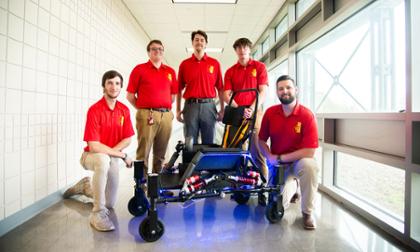
At the same time, they’re living the Pittsburg State motto: “By Doing, Learn.”
The team – Zachary Stotler, Matt Hendren, Christian Schultz, Jesus Corral and Justin Duvall – aims to help support the work of the non-profit LEARN’s Geeks for Kids program, a STEM enrichment program that pairs student engineers with professional technologists to design and build meaningful technology.
The Geeks for Kids program supplies children with movement limitations with an alternative to a wheelchair that is affordable, safe, and customizable.
“These are kids who want to be kids – to get outside, race around and play with others – but they sit on life’s sidelines because they cannot get around on their own,” said Geeks for Kids President Rebecca Kidwell. “Our goal is to help them explore and play on their own."
The challenges of each child varies — some can’t walk, others can’t use their hands, some can move only their heads and necks.
“We build custom, electric cars for them,” Kidwell said. “We’ve made 139 cars for 141 kids in the last three years, and we’re making more and more all the time due to demand."
That’s where PSU students come in.
This project is the latest of numerous real-world projects directed by Professor of Engineering Technology David Miller. Past teams have created a pedicab for Live Well Crawford County to accommodate riders who use wheelchairs, and they have designed and fabricated Baja vehicles and moon rover projects for national competitions.
“Our team is stretched so thin, and one of David’s teams wanted to help design a special chassis and power train,” Kidwell said. “Their work combined with the work of our other teams will one day give more kids the #Power2Play in a wider range of settings.”
Geeks for Kids will refine and expand upon the PSU team’s product to make it reproducible, polished, affordable, and commercial grade so it lasts and lives up to the rigors of children’s play.
The organization also will add electronics, programming, specialized seating and support devices such as an IV or a breathing pump, customized to each child.
The PSU team based the design on an early prototype that LEARN’s high school robotics team had modeled on a lunar rover.
“The Pitt State team did a great job at taking a concept from a small-scale model to a full-size chassis,” Kidwell said. “In the years ahead, we will refine and build upon their work. We look forward to one day putting our next gen vehicle on the test track for the first time."
Learn more:
The mechanical engineering technology program is accredited by the Engineering Technology Accreditation Commission of ABET. The program has had at or near 100 percent placement throughout its history, with starting salaries at $60,000 to $65,000.